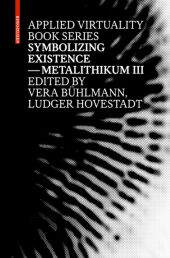 Neuerscheinungen 2016Stand: 2020-02-01 |
Schnellsuche
ISBN/Stichwort/Autor
|
Herderstraße 10
10625 Berlin
Tel.: 030 315 714 16
Fax 030 315 714 14
info@buchspektrum.de |

Vera Bühlmann, Ludger Hovestadt
(Beteiligte)
Symbolizing Existence
Metalithikum III
Herausgegeben von Hovestadt, Ludger; Bühlmann, Vera
2016. 260 S. 108 b/w ill. 235 mm
Verlag/Jahr: BIRKHÄUSER BERLIN 2016
ISBN: 3-03-560378-2 (3035603782)
Neue ISBN: 978-3-03-560378-1 (9783035603781)
Preis und Lieferzeit: Bitte klicken
Die Beiträge des Symposiums Symbolizing Existence folgen der immer rascher fortschreitenden "Deterritorialisierung" von Realität: Die Art und Weise, wie der soziale Raum mittlerweile informationstechnisch durchdrungen wird, stellt ein eigenartig a-territoriales Substrat dar, das für die Entwicklung eines digitalen Konstruktionsdenkens eine tragende Rolle spielt.
Denn heute erfasst und beschreibt ein elektronischer Code den gesamten Bereich dessen, was sich geometrisch, funktional und logisch darstellen lässt. Solche "Beschreibungen" etablieren in dem, was sie beschreiben, logistische Ordnungen: als Netze von vielwertigen Punkten, die sich unterschiedlich verbinden und verteilen lassen. Ein Punkt etwa kann hier nicht mehr länger als "das, was keine Teile hat" (Euklid) erachtet werden, sondern müsste, so der Fokus des Symposiums, als "das, was in reziproker Weise doppelt artikuliert ist", erachtet werden.
Ein interdisziplinäres Lesebuch für Architekten mit Interesse an Mathematik, Informatik, Geometrie - und an deren Bedeutung für aktuelle Entwicklungen des digitalen Entwerfens.
Symbolizing Existence deals with the current rapidly happening "deterritorialization" of everything which was once regarded stable and binding. What we today regard as statistically encoded information is capable to explicate and index the entire realm of what can be expressed and represented through a cascade of geometrical, functional, or finally logified schemes. We are currently experiencing a rapid loss of "grounding" of that which we once considered binding in our cultural and intellectual history. How can we obtain an articulate, cultivate way of thinking about "instances" that does not fall back into a schematic model Platonism (thereby falling behind Plato), and that does not remain enmeshed in an Aristotelian realization dynamics with a naturalism organized by original genus, kinds, and specific marks of distinction?The central phenomenon considered was the technological process of doping material: At the quantum level, a particle or its representation, the point, is no longer "that which has no parts" (Euclid).
Ludger Hovestadt, ETH Zürich; Vera Bühlmann, ETH Zürich


